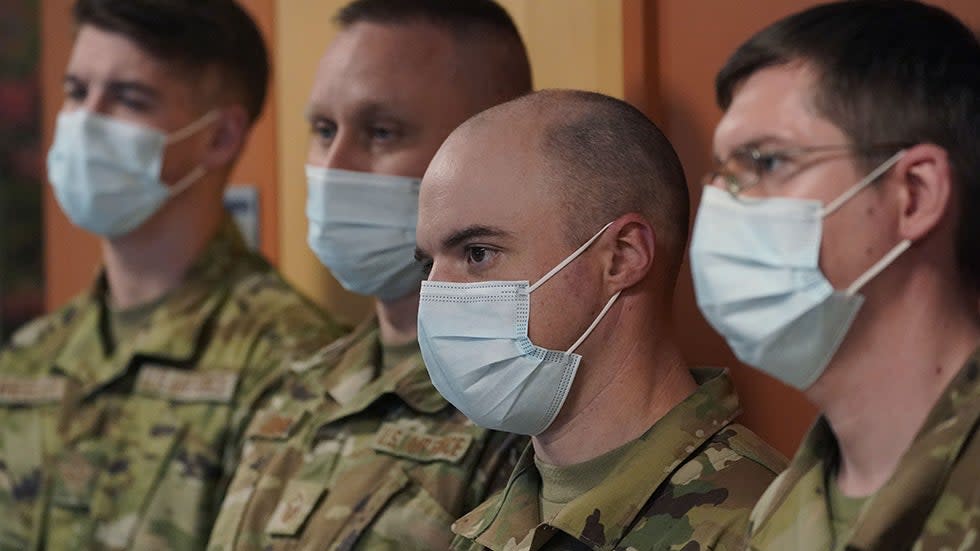Pentagon goes on offense vs GOP on vaccine mandates

- Oops!Something went wrong.Please try again later.
The Pentagon is on the offensive after a cascade of Republican lawmakers have pushed back over a COVID-19 vaccine mandate for service members.
The issue has quickly snowballed since early last month, when Oklahoma Gov. Kevin Stitt (R) tipped off the battle over who calls the shots in enforcing the requirement for National Guardsmen.
Now, with Texas becoming the seventh state to declare they will not impose the mandate on their National Guard, the Pentagon is grappling with how to make sure its mandate is followed and how to prevent further states from piling on and resisting it.
"We're not going to make an active effort here to try to tell other states not to express their concerns. So I don't know plans to proactively reach out to governors on this," Pentagon press secretary John Kirby told The Hill when asked whether Defense Secretary Lloyd Austin planned to contact governors he thinks might follow suit.
"The only thing I would say is what I've said before - the vaccine is a valid military readiness requirement. It remains such."
The Biden administration's vaccine mandate has become a hot-button issue in the military since Austin announced in late August that it would be applied to all defense personnel.
The Pentagon chief allowed each military service to set its own deadlines for compliance, with most falling on dates in November and December and the furthest out belonging to the Army National Guard's and Reserve's June 30 cutoff.
But Republican lawmakers have repeatedly called for the department to rescind the requirement, arguing or backing a range of claims, including Stitt's stance that the mandate is unconstitutional and will hurt national security.
"This mandate ensures that many Oklahoma National Guard members will simply quit instead of getting a vaccine, a situation that will irreparably harm Oklahomans' safety and security," reads a complaint filed Dec. 2 by the state of Oklahoma in a federal lawsuit.
Stitt, who in early November first asked Austin to exempt his state's National Guard members from the mandate - a request which the Pentagon chief denied - has been at odds with the department ever since, declaring that he would not enforce the requirement for the Oklahoma guard.
The battle, at its core, comes down to the Pentagon's murky authority over the National Guard while troops are under Title 32 of the U.S. Code, the law that allows a governor to manage their state's guardsmen unless they are called up for federal duty.
The National Guard, which has dueling obligations to both the state and federal government, falls under federal authority when mobilized by the president, as stipulated by Title 10 of the U.S. Code.
Making things more complicated, even while under Title 32 guard troops are paid with federal dollars when they receive training or further education, a fact that means they must follow the mandate regardless of duty status, according to Defense officials.
But Stitt argues that until his guardsmen are called up by the president, the vaccine mandate exceeds Austin's authority.
Not so, Austin shot back, producing a late November memo that made clear all National Guard and Reserve troops - even those on state duty - who do not get the shot could face loss of pay, among other consequences.
And the Pentagon has long made clear that separation from the military was the ultimate punishment should service members continue to resist past their deadlines.
The fight has prompted several more Republican state leaders to pile on, including Iowa Gov. Kim Reynolds, Alaska Gov. Mike Dunleavy, Mississippi Gov. Tate Reeves and Nebraska Gov. Pete Ricketts. The five governors on Dec. 14 sent Austin a letter telling him that setting such punishments for refusing to take the shot is "beyond your constitutional and statutory authority."
Days later, Texas Gov. Greg Abbott (R) added his voice to the debate, writing to Austin that Texas "will not enforce this latest COVID-19 vaccine mandate against its guardsmen."
Despite the pushback, defense officials hope the consequences of remaining unvaccinated, including separation from the military, will help dissuade service members from resisting the shot.
The Air Force became the first military branch to confirm it went through with that warning, revealing on Dec. 14 that it discharged 27 service members for declining the vaccine.
Since then, the other services have followed suit and moved to kick out several hundred troops, sailors, airmen and guard members, including the Marine Corps' most recent ouster of 169 Marines as of Thursday.
But one major question that has emerged in the midst of the fighting is how the Pentagon can now make sure National Guard members are flagged and processed for separation after they repeatedly refuse the shot in states with leaders that have made clear they won't enforce such a move.
If their own governors are refusing to enforce the mandate, who then holds guard members responsible for following suit?
The Pentagon has struggled to answer that particular issue, with Kirby on Tuesday only offering that it is the department's expectation that the chain of command "will manage the mandatory vaccine requirement appropriately, and if they don't, then they too can be held to account under the [Uniform Code of Military Justice] for failure to obey a lawful order."
Pressed further on how the Pentagon can ensure National Guard commanders would flag those under them if their governor said they don't have to, Kirby replied: "I don't think I can answer the question any more than what I've done."

